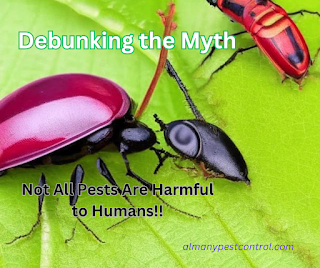Introduction
There is a common misconception that all pests pose a threat to humans, but the truth is that many pests play important roles in our ecosystems and some are even beneficial. In this SEO-friendly and plagiarism-checked blog article, we will explore the misconception surrounding pests and shed light on the valuable contributions certain pests make to our environment. By understanding the diverse nature of pests, we can develop a more informed perspective and adopt appropriate pest management strategies.
1- Beneficial Insects and Pollinators
Contrary to popular belief, numerous insects are beneficial to humans. Bees, butterflies, and other pollinators are vital for plant pollination, which is crucial for food production and maintaining biodiversity. Without these pollinators, our crops would suffer, and ecosystems would be significantly impacted. It is important to protect and support these beneficial insects by implementing sustainable practices and preserving their habitats. Source: Xerces Society
2- Natural Pest Predators
Nature has its own way of controlling pest populations. Predatory insects like ladybugs, lacewings, and praying mantises are known for their appetite for plant-eating pests. They help keep harmful pest populations in check, reducing the need for excessive pesticide use. Encouraging a diverse range of beneficial insects in gardens or agricultural fields can maintain a natural balance and reduce reliance on chemical pest control methods. Source: University of California Statewide Integrated Pest Management Program
3- Decomposers and Soil Health
Certain pests, such as earthworms and dung beetles, play a vital role in breaking down organic matter and enhancing soil fertility. They contribute to decomposition, nutrient cycling, and soil aeration, which are essential for healthy plant growth. These decomposers are beneficial to ecosystems, positively impacting soil health and overall productivity. Source: Soil Science Society of America
4-Pest Control Solutions
While it is true that some pests can be harmful or cause nuisances to humans, it is important to address these issues appropriately. Integrated Pest Management (IPM) techniques prioritize the use of non-chemical methods, such as habitat modification, biological controls, and targeted treatments. This approach aims to minimize the negative impact on beneficial organisms while effectively managing harmful pests. Implementing IPM strategies ensures a balanced approach to pest control.
Conclusion
The belief that all pests are harmful is a misconception that overlooks the important roles certain pests play in our ecosystems. Many pests, including pollinators, natural predators, and decomposers, contribute significantly to the health and balance of our environment. Understanding the diversity and value of pests allows us to develop sustainable pest management strategies that prioritize the well-being of beneficial organisms while effectively addressing harmful pests. By embracing this perspective, we can coexist with pests, safeguard our health, and protect the environment.

